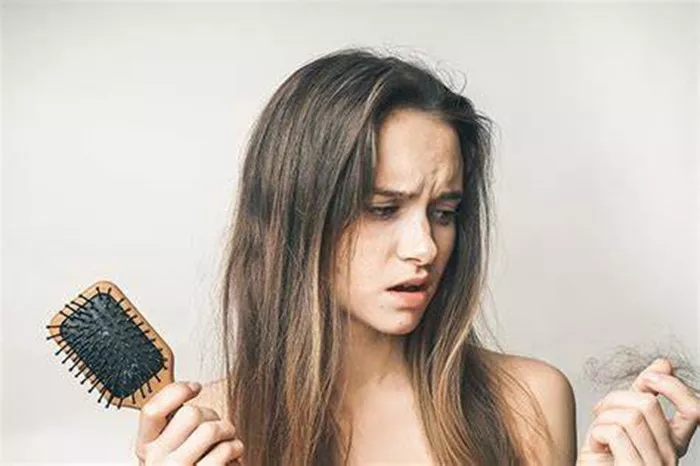Menopause is a significant transition in a woman’s life, bringing various physical and emotional changes. One of the more distressing changes for many is hair loss. This article explores when menopause-related hair loss occurs, its causes, and when it might stop, along with practical tips for managing this condition.
Menopause marks the end of a woman’s reproductive years, typically occurring between the ages of 45 and 55. Alongside symptoms like hot flashes and mood swings, many women experience hair loss, which can be alarming and frustrating. Understanding the timeline of hair loss during menopause and what to expect can help ease anxiety and guide effective coping strategies.
Understanding Menopause and Hair Loss
What Happens During Menopause?
Menopause is defined as the cessation of menstruation for 12 consecutive months. This transition involves significant hormonal changes, primarily a decline in estrogen and progesterone levels. These hormonal shifts can impact various bodily functions, including hair growth.
How Hormones Affect Hair Growth
Hair growth is a complex process influenced by several factors, including hormones. Estrogen promotes hair growth and helps keep hair healthy, while a decrease in this hormone can lead to thinning hair. As estrogen levels drop during menopause, many women notice changes in their hair density and texture.
When Does Hair Loss Start During Menopause?
Typical Onset of Hair Loss
Hair loss during menopause can begin in the years leading up to menopause, known as perimenopause. Many women may notice the following patterns:
Perimenopause (Ages 40-55): Hair loss may start during this transitional phase, as hormonal fluctuations begin. Women might experience thinning hair or increased shedding.
Menopause (Around Age 51): The most significant hair loss typically occurs around the time of menopause. This is when estrogen levels drop sharply, leading to noticeable thinning.
Post-Menopause (After Age 52): Some women may continue to experience hair loss for several years after menopause, while others find it stabilizes.
Individual Variability
Every woman’s experience with menopause and hair loss is unique. Factors influencing this variability include:
Genetics
Overall health
Lifestyle choices
Nutritional status
How Long Does Menopause Hair Loss Last?
Duration of Hair Loss
While some women may experience hair loss only during the menopausal transition, others may face ongoing issues for years. Here’s a general outline of what to expect:
Initial Hair Thinning: This may last for several months to a couple of years, often beginning in perimenopause.
Peak Hair Loss: For many, the most intense hair loss occurs during the first few years of menopause, potentially stabilizing after this period.
Long-Term Effects: Some women may continue to notice thinning hair in the years following menopause, while others find their hair stabilizes and may even regrow.
Factors Influencing Duration
Several factors can influence how long hair loss lasts during menopause:
Genetic Predisposition: Women with a family history of female-pattern baldness may experience longer-lasting effects.
Hormonal Therapy: Some women may choose hormone replacement therapy (HRT), which can help mitigate hair loss.
Overall Health: Conditions such as thyroid issues or nutritional deficiencies can exacerbate hair loss and prolong its duration.
Managing Menopause Hair Loss
While experiencing hair loss during menopause can be distressing, there are several strategies to help manage and potentially improve hair health:
1. Nutritional Support
A well-balanced diet can play a crucial role in maintaining healthy hair. Key nutrients include:
Protein: Hair is primarily made of protein, so ensuring adequate intake is essential.
Vitamins and Minerals: Nutrients like biotin, vitamin D, iron, and zinc are vital for hair health. Incorporating foods rich in these vitamins can support hair growth.
2. Gentle Hair Care
Using gentle hair care products can help minimize damage:
Avoid Harsh Chemicals: Limit the use of products with sulfates or alcohol, which can dry out hair.
Gentle Styling: Minimize heat styling and tight hairstyles that can cause breakage.
3. Stress Management
Stress can exacerbate hair loss. Engaging in relaxation techniques such as yoga, meditation, or deep breathing can help manage stress levels.
4. Consult a Healthcare Professional
If hair loss is severe or concerning, consulting with a healthcare provider or dermatologist can provide valuable insights. They may recommend treatments such as:
Hormone Replacement Therapy (HRT): This can help stabilize hormone levels and potentially reduce hair loss.
Topical Treatments: Minoxidil is a common treatment for hair thinning that may be effective.
Understanding Regrowth After Menopause
Timeline for Regrowth
After menopause, some women may experience hair regrowth, while others may continue to face thinning. If hair regrowth occurs, the timeline can vary:
Initial Growth: Many women may see signs of regrowth within six months to a year after menopause.
Thickening of Hair: As time goes on, new hair may become thicker, but this process can take several years.
Supporting Hair Regrowth
To promote healthy hair regrowth, consider the following:
Continued Nutritional Support: Maintaining a diet rich in essential nutrients is crucial for supporting hair health.
Scalp Care: Regularly massaging the scalp can promote blood circulation and potentially enhance hair growth.
Patience and Realistic Expectations: It’s essential to have realistic expectations about the regrowth process, as it can take time.
Conclusion
Menopause can bring about various changes, including hair loss, which can be concerning for many women. While the timeline for when hair loss starts and stops can vary, understanding the process can help ease anxiety and foster effective coping strategies. With the right care, support, and treatment options, many women can navigate this transition with greater confidence.
Related topics:
- When Do You Start Losing Hair During Chemo?
- Understanding Male Pattern Baldness: When Does It Start?
- When to Worry About Hair Loss: Understanding the Signs


